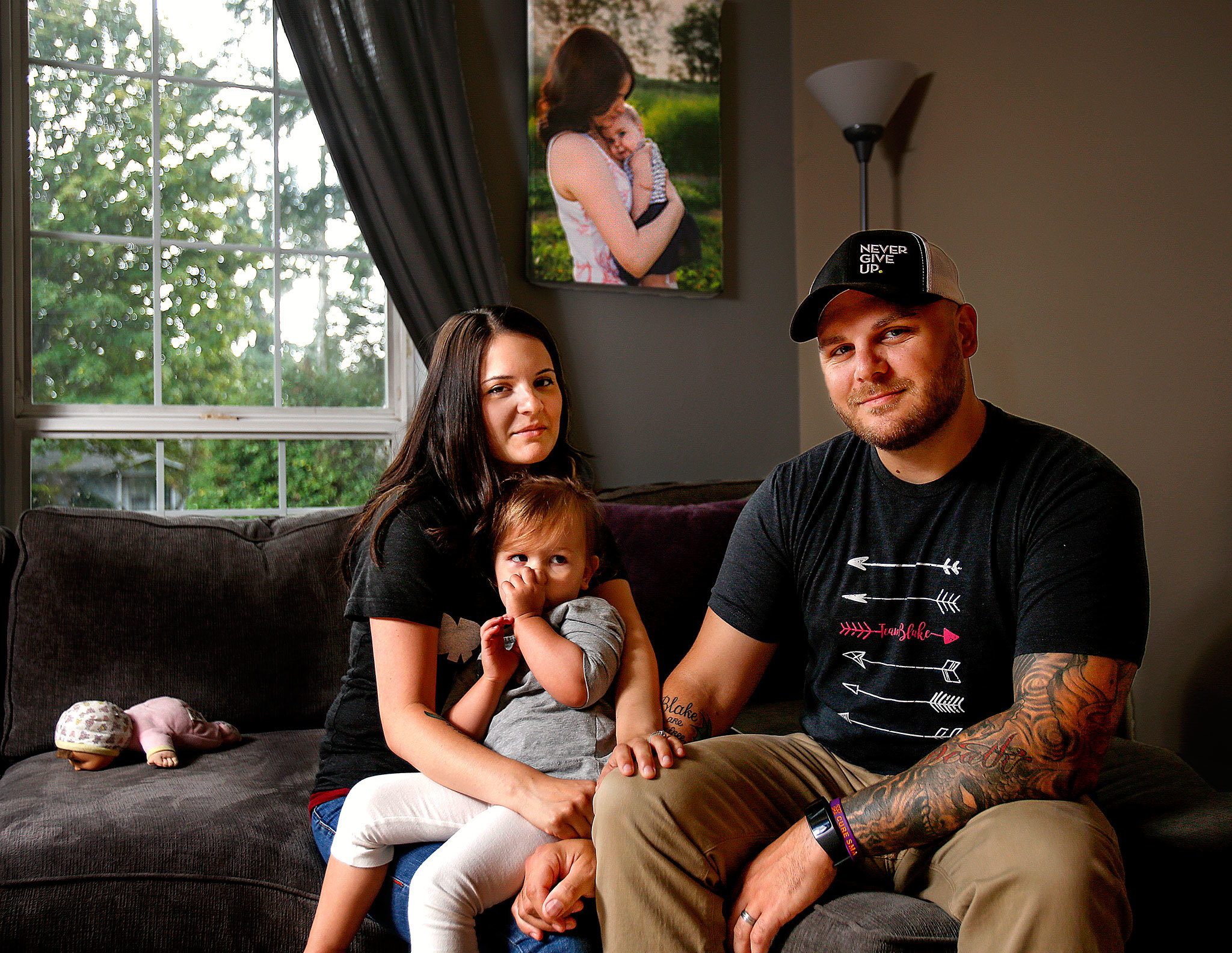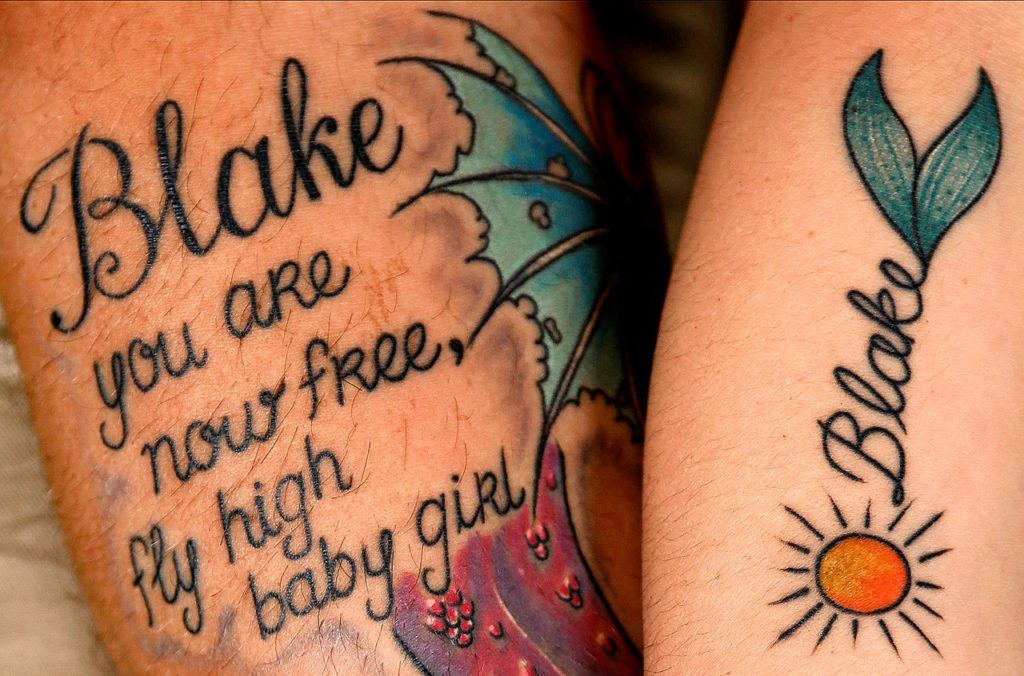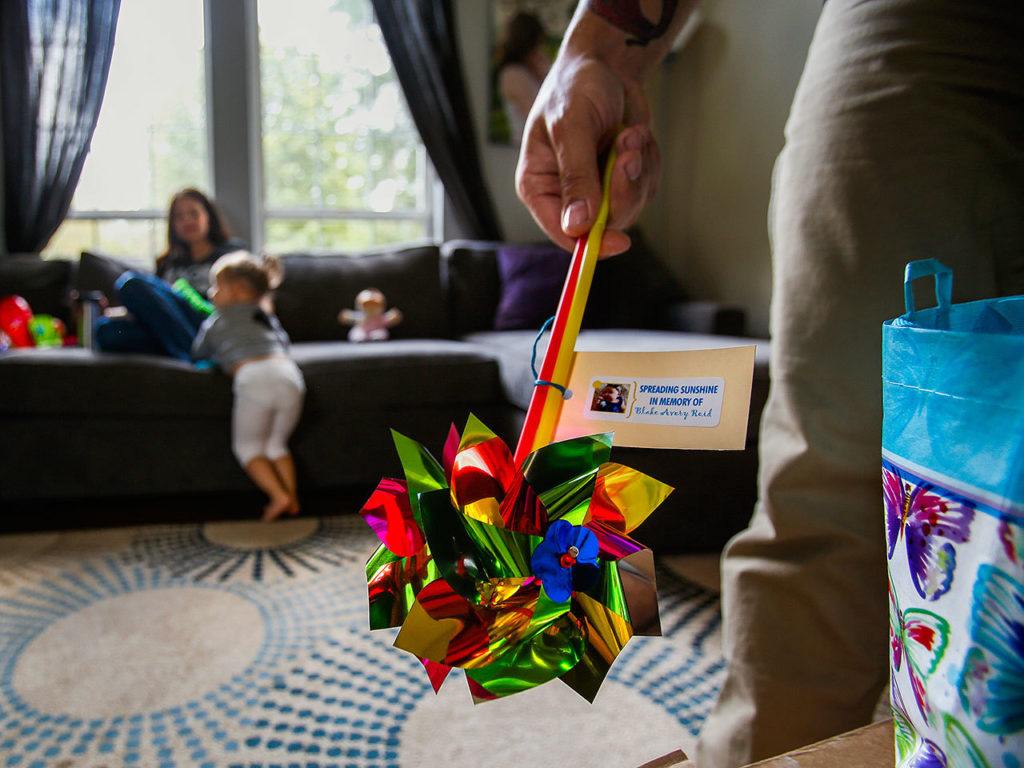In just one year, Marysville’s Stephanie and Jeff Reid tasted life’s greatest joy and endured its cruelest loss.
The Reids learned crushing news, filled their home with love and reached out to others in kindness. In just one year, they became a family of four — and then, a family in grief.
Their story is told in Stephanie Reid’s blog. She calls it Still Finding Sunshine.
A year ago, on Sept. 17, 2015, they welcomed their second baby girl. They named her Blake, but soon were calling her Blakey. They delighted in watching Kenley, their firstborn, embrace her role as big sister. Today, 2-year-old Kenley struggles to understand why Blakey isn’t with her.
Blake Avery Reid died Aug. 10 in her father’s arms.
In early March, when Blake was almost 6 months old, she was diagnosed with spinal muscular atrophy type I. There is no cure for the hereditary neuromuscular disease. Most babies with SMA type I die within two years of birth.
A neurology specialist at Seattle Children’s Hospital confirmed the couple’s worst fears about Blake’s low muscle tone. The baby had been seen by a physical therapist. A nurse practitioner told the Reids she saw hope for improvement. Yet all along, the parents expected bad news.
“I felt from birth that something wasn’t right,” Stephanie Reid, 29, said Monday. “She never, never lifted her head. She never rolled over.”
That March day, the specialist failed to find any reflex response in Blake. Her parents learned her condition likely was SMA. A blood test confirmed what they had dreaded.
More blood tests revealed genetic information about Jeff and Stephanie Reid — information they say they should have known long before Blake’s birth. Both are carriers of a genetic mutation that causes spinal muscular atrophy.
When both parents are carriers, they learned, a couple’s risk for having a child with SMA is 25 percent for each pregnancy. Kenley is unaffected by the disease.
“With a $300 blood test, we could have known this is a risk,” said Jeff Reid, a 31-year-old combat veteran who served with the Army in Iraq. “We’re trying to bring awareness that people can have a genetic test.”
According to the National Institutes of Health, SMA types I, II and III cause wasting of voluntary muscles in the arms and legs of infants and children. An abnormal or missing gene prevents production of a protein essential to motor neurons. Along with weakness and floppy limbs, the disease hampers swallowing and impairs breathing.
Raw with sadness, Stephanie Reid used her blog to chronicle family life and their roller coaster of emotions. On April 10, in an entry titled “The days after diagnosis,” she wrote that her husband at first likened their devastating news to “watching a horrible movie.” They tried to heed advice from a friend whose loved one had terminal cancer. Reid wrote that her friend told her “to try to live for today.”
A month later, in her May 9 blog entry “Being a mom,” she told how they aimed to live each day: “I can’t change Blake’s diagnosis; I can’t heal her, as much as I want to. … What I can do is make plans for her little life that honor her.”
That is what they chose to do. Reid’s powerful blog is both uplifting and heartbreaking. She tells how Blake loved watching the animated movie “Minions.” Their baby experienced the beach and parks, the warmth of the sun and the freedom of a swimming pool.
Blake became progressively weaker — she eventually was bottle fed after she could no longer breastfeed. Throughout her short life, the Reids chose to keep her at home, not in a hospital. Blake was visited by a hospice nurse. Every day, they focused on their baby’s comfort, happiness and quality of life.
They decided against what they saw as invasive treatments, including tube feeding and mechanical respirators. The Reids know that other parents, faced with the same diagnosis, make different choices.
Today, a corner of their playroom is filled with toys and boxes. The new toys, baby swings and special comfort blankets are part of the couple’s outreach to other families through Cure SMA, a national nonprofit organization.
Not long after Blake’s diagnosis, the Reids received a big box. It was a care package from Cure SMA filled with those things. Now the Reids are collecting toys that will be sent to Cure SMA for care packages going to other families coping with the disease. Their baby didn’t see her first birthday. The toy drive has been a way to honor her.
Everyone receiving any of the items will see a sticker that says “Spreading sunshine in memory of Blake Avery Reid.” The Reids also joined in a recent fundraising walk in Auburn for Cure SMA. Their team raised more than $7,200, Stephanie said.
Unable to change the diagnosis, Blake’s family resolved that she would have “a happy life and an easy death,” Stephanie Reid said.
Now, they want other couples to know about genetic screening. “We don’t regret Blake at all, but we wouldn’t do that to another child,” Jeff Reid said. With knowledge that they were carriers, they would have had options.
“We wish Blake were still here. Under the circumstances, her life was the best it could be,” said Jeff Reid, who added a new tattoo to his arm after his baby died. “Blake you are now free, fly high baby girl,” it says. His wife also has Blake’s name on her arm, along with a sun and a mermaid tail. Although Blake couldn’t move her legs, in the water she could. Her parents called her “our mermaid.”
During the celebration of Blake’s life at Rosehill Community Center in Mukilteo, the family wore bright colors. They served cupcakes and released butterflies.
Stephanie Reid recalled what she said that day: “No matter your circumstances, you can always live life.”
Julie Muhlstein: 425-339-3460; jmuhlstein@heraldnet.com.
Read more
Read Stephanie Reid’s blog about the loss of her 11-month-old daughter, Blake, and find out how to help with the family’s toy drive at www.stillfinding sunshine.com.
Learn about spinal muscular atrophy at www.curesma.org/sma/about-sma.
Talk to us
> Give us your news tips.
> Send us a letter to the editor.
> More Herald contact information.




























